Read this ebook for free! No credit card needed, absolutely nothing to pay.
Words: 20964 in 6 pages
This is an ebook sharing website. You can read the uploaded ebooks for free here. No credit cards needed, nothing to pay. If you want to own a digital copy of the ebook, or want to read offline with your favorite ebook-reader, then you can choose to buy and download the ebook.


: Chambers's Journal of Popular Literature Science and Art No. 706 July 7 1877 by Various Chambers Robert Editor Chambers William Editor - Periodicals Chambers's Edinburgh Journal
Editor: William Chambers Robert Chambers
STORY OF THE FAIRBAIRNS.
Andrew did not return to sea-life. He had had enough of naval adventure. Kelso, where he pitched his camp, is a pretty inland town on the north bank of the Tweed, once celebrated for an abbey, of which the ruins still exist, and having in its immediate neighbourhood the palatial mansion of Fleurs, the seat of the Dukes of Roxburghe. All around is a fine fertile country, where there is abundant scope for agricultural pursuits. To these he addicted himself, though taking him six days a week from home, and obliging him to devolve the upbringing of his children in a great measure to his wife, who was eminently suited for this important duty. She was far from robust, and her poor state of health would have offered a good excuse for idleness; but possessing a spirit of indefatigable industry, she toiled in a way that reminds us of the singularly meritorious wife mentioned in Scripture--'She seeketh wool and flax, and worketh willingly with her hands.... She looketh well to the ways of her household, and eateth not the bread of idleness.... Her children arise up, and call her blessed.' The picture is accurate in every detail. According to the economy of the period, when as yet the domestic spinning-wheel was in operation, Mrs Fairbairn bought wool and flax, which she spun into yarn, reeled into hanks, and gave out to a weaver to be manufactured. From the varied materials so produced, she provided shirtings, sheets, and blankets for the family. And not only so, but for some years she made all the coats, trousers, and other garments for her husband and sons, besides all the dresses required for her young daughters.
The employment so secured was not much to speak of: it was only that of driving a coal-cart, but nothing better cast up, and was dutifully endured amidst a dissolute and contentious population, until, at the instance of the owners of the colliery, William, in 1804, was bound apprentice for seven years to Mr John Robinson, the engine-wright of the establishment. Such was the start in life of William Fairbairn as an engineer. At first, his wages were five, afterwards rising to twelve, shillings a week; but there was extra work paid for separately, by which his small wage was often doubled, and he was able to help his parents, who were struggling with a very limited income.
As we all know, there are two ways of pursuing an industrial occupation in youth. One is to do no more than what is immediately required, caring little for the future; the other is to endeavour, by every available means, to strike out a course of self-improvement, not only for the pleasure of doing so, but it may be in the hope of reaping some future advantage. William Fairbairn adopted the latter method of getting through his apprenticeship. He laid down for himself a programme of self-instruction, while most other lads about him spent all their leisure time in coarse and profitless amusements. His weekly programme is worth the attention of young men placed in similar circumstances. Every day had its assigned work--Monday evenings, the study of arithmetic and mensuration. Tuesday, reading history and poetry. Wednesday, recreation, reading novels and romances. Thursday, mathematics. Friday, Euclid, trigonometry. Saturday, recreation and sundries. Sunday, church, reading Milton, &c. These several exercises were facilitated by books procured from the North-Shields subscription library, for which his father bought for him a ticket. Besides going through a course of reading the best historical and other works, which widened his knowledge and cultivated his feelings, he in a period of three years went through a complete system of mensuration, and as much algebra as enabled him to solve an equation; also a course of trigonometry, navigation, and some other branches of science. At times he devised pieces of machinery, which taught him the necessity of arranging and concentrating his ideas in matters of mechanical ingenuity. Having a taste for music, he made a violin, on which he taught himself to play familiar Scotch airs, though never with any degree of brilliance. His mind leaned towards more solid acquirements. As a kind of promotion, he was removed from the workshop to take charge of the steam-engine and pumps. Now, he was more his own master, and had intervals of time at his disposal. No amount of leisure, however, diverted him from his course of self-culture. His companions spent not a little time and money in beer-drinking, which kept them in poverty, and effectually stood in the way of their advancement. One of his early contemporaries was happily superior to these debasing pursuits. This was George Stephenson, with whom he became acquainted. George had the charge of an engine at Willington Ballast Hill, only a mile or two off, and being recently married, was somewhat pinched in the means of livelihood. To enable him to earn a few shillings, Fairbairn frequently took charge of his engine, while he took a turn at heaving ballast out of the colliery vessels. It is interesting to hear of facts like this of two men who rose to eminence through self-culture and unrelaxing perseverance.
At the close of his apprenticeship, and now twenty-two years of age, William Fairbairn went to London in search of employment as a millwright or working engineer. At this time Rennie was engaged in building Waterloo Bridge, and offered work to William Fairbairn. But--and a sad 'but' it was--the Millwrights' Society, which assumed the right of determining who should be employed, would not allow work to be given to him; and for a time, along with a companion similarly situated, he underwent serious privations. Unless for succour from some hospitable relatives who gave him a dinner on Sunday, he would have been well-nigh starved. A brighter day at length dawned. A number of workmen had the fortitude to resist the monopoly of the Millwrights' Society, and banding together, set up a Society of free and independent labourers, under whose auspices Fairbairn got employment at a patent Ropery at Shadwell. Here and elsewhere he wrought as a journeyman two years in the metropolis, all the time realising good wages of from two to three pounds a week, and as formerly occupying his leisure hours mostly in reading. As he lived moderately, he saved some money, with which he hoped to push his way forward. Unluckily, he fell in with a crazy projector, who had devised a plan of delving land by machinery. The thing was ingenious, but not practicable. Induced to make a machine for the inventor, Fairbairn's small savings were swept away. He was more fortunate in his next order. It was to make a machine for chopping meat for sausages, for which he was promised thirty-three pounds by a pork-butcher. The machine, constructed with a fly-wheel and a double crank, with a dozen knives crossing each other, did its work admirably. The pork-butcher was delighted, and paid handsomely for the machine.
Put in pocket by this piece of business, Fairbairn proceeded to Dublin in quest of work, and got employment in constructing nail-making machinery. This lasted during a summer, and back he came to England, the voyage by packet to Liverpool occupying two days. A lucky thought directed him to try Manchester as a field of operations. Here he received employment from Mr Adam Parkinson, for whom he worked two years, and from his earnings was able to save twenty pounds, a sum which he destined to set him up in married life. For several years he had corresponded with Dorothy Mar, daughter of a farmer at Morpeth, and for whom he entertained an ardent affection. Fortune, as he imagined, being now propitious, marriage with Miss Mar could be discreetly contemplated, and the marriage took place June 16, 1816. The young pair commenced housekeeping in a very small and modest domicile at Manchester. William Fairbairn had still to make his way in the world, and blest with this good wife, set about doing it vigorously. For certain spheres of usefulness, Manchester offers better scope than even London. In partnership at first with Mr James Lillie, he began an independent career as a millwright, or in fact, a contractor for any large undertaking from a bridge to a spinning-factory. The two in setting up business had hardly any money, but they had brains, which had been pretty well exercised, and people were disposed to throw work in the way of what seemed to be two eager and clever young men. A large job executed for Mr Murray, a cotton-spinner, put them on their feet. Well-doing needs only a beginning. Almost immediately followed the works on a new cotton-mill for Mr John Kennedy, partner in the firm of Messrs M'Connel and Kennedy, then the largest spinners in the kingdom. The skilful manner in which improvements were introduced into the new mill brought a press of orders. The business prospered so greatly, that at the end of five years the two young men found themselves with a stock and tools worth five thousand pounds. Large and commodious premises were erected, and contracts for gigantic works were undertaken in England, Scotland, and Switzerland.
Fairbairn lived at a time when the world was startled with the marvels of steam-traction on railways, and he fancied that a similar means of propulsion could be adopted on canals. In this, after several costly experiments, he found himself mistaken, and the drainage of money was so great as to lead to a dissolution of his partnership with Mr Lillie. Now , he rested entirely on his own energies and resources; but strong in self-reliance, he had no fears of the result. He turned his attention to a new branch of engineering manufacture, that of iron ship-building. For a time he had two establishments, one in London, the other in Manchester, and collectively employed two thousand hands. In 1835 began his famous investigations into the strength of iron, as regards girders, beams, pillars, and so forth; his experiments being of much scientific and mechanical importance. This, indeed, might be described as the great work of Fairbairn's life; for from his discoveries has sprung that remarkable adaptation of cast-iron in various forms--to house-building, the construction of bridges, and other works. About the same time, owing to a strike of boiler-makers at Manchester, he invented a method of riveting the plates of boilers by machinery, which at once superseded hand-labour. No longer were people assailed with the din of a hundred hammers riveting together iron plates; the machine of Fairbairn's invention substituted a rapid, noiseless, and comparatively cheap method of construction.
Sir William Fairbairn never, as we know, aimed at being a great man. He wanted only to be useful in his day and generation. His habits of industry were extraordinary. Besides devoting himself specially to new mechanical contrivances and scientific researches, he spent much time in his later years in writing papers for the British Association and other public bodies. On one subject he fastened keenly. It was the prevention of smoke from factory chimneys, which he shewed could be effectually done by a more perfect combustion of fuel. The paper appeared in the Transactions of the British Association for 1844. It is doubtful if it made many converts. There seems to be a determination among manufacturers to disregard all advice or remonstrance on the subject. For more than thirty years we have used a plan for consuming smoke with perfect success and considerable economy of fuel, but our neighbours for the most part perversely go on polluting the atmosphere as usual.
As is well known, Sir William Fairbairn distinguished himself by his invention of the tubular iron bridge, sustained without stays, and, which adopted by Stephenson, was employed in the construction of the famous tubular iron bridge across the Menai Strait, which is entitled to be called the mechanical wonder of England. We have never been shot along in a railway train through that iron tube, formed by a succession of square cells placed end to end, without thinking of Fairbairn's bold ingenuity. The reputation he acquired by this and other inventions of a useful kind brought him honours from numerous quarters. He had declined to accept a knighthood, and was reserved for the higher dignity of a baronetcy, which was conferred during Mr Gladstone's tenure of office in 1869. Two years previously, he had the misfortune to lose his eldest son, John, a blow which was severely felt by him. Coming from a long-lived family--his father dying in 1844 at the age of eighty-six--and tall, robust, and active, he enjoyed health till nearly the end of his days. He died peacefully August 18, 1874, leaving three sons and a daughter, also a widow, to mourn his loss. He was succeeded in the baronetcy by his son Thomas. Though the family wished the funeral to be private, it was, as a voluntary mark of respect, attended by upwards of fifty thousand persons. Such was the end of one of the greatest engineers of our day. His whole life pointed a valuable moral which it is unnecessary to repeat. His brother, Sir Peter Fairbairn of Leeds, predeceased him, leaving likewise descendants to perpetuate the reputation of the Fairbairns.
W. C.
THE LAST OF THE HADDONS.
Free books android app tbrJar TBR JAR Read Free books online gutenberg
More posts by @FreeBooks


: The Chautauquan Vol. 03 May 1883 by Chautauqua Institution Chautauqua Literary And Scientific Circle Flood Theodore L Editor - Chautauqua Literary and Scientific Circle Periodicals; Chautauqua Institution Periodicals







